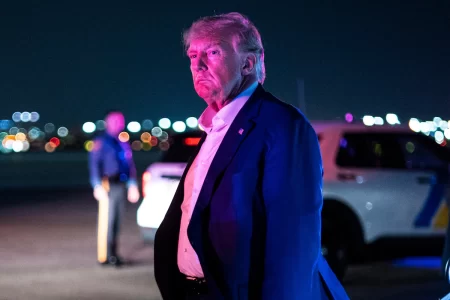A key area of interest is the conduct of a handful of lawyers who sought to turn Trump’s defeat into victory by trying to convince state, local, federal and judicial authorities that Joe Biden’s 2020 election win was illegitimate or tainted by fraud.
Special counsel Jack Smith’s team has extensively questioned multiple witnesses about the lawyers’ actions related to fake electors — pro-Trump substitutes offered up as potential replacements for electors in swing states that Biden won.
The Washington Post has reported that Giuliani, a personal attorney for Trump who took over his campaign’s legal efforts after the 2020 election, coordinated the fake-elector effort. Ellis helped him urge state legislatures to reject certified Biden results, while Eastman argued to Trump that Vice President Mike Pence could accept alternate slates when certifying the electoral votes on Jan. 6, 2021. Chesebro wrote several memos on the fake-elector strategy. Olsen urged lawsuits to overturn the election results in several states, and Clark pressed Trump’s fraud claims from within the Justice Department.
Giuliani, Ellis, Clark, Eastman, Chesebro and Olsen or their representatives either did not respond to requests for comment or declined to comment Monday.
Smith, a longtime federal prosecutor who was appointed special counsel by Attorney General Merrick Garland in November, charged Trump this month with 37 counts alleging that he willfully retained classified documents at his Florida residence after leaving the White House and obstructed government efforts to retrieve them.
Garland also put Smith in charge of a separate investigation of efforts to overturn the election results. That probe appears to be focused on fraud-related charges, according to subpoenas reviewed by The Post and interviews with witnesses, lawyers and others familiar with evidence being presented to a federal grand jury in Washington.
In addition to its focus on fake electors, Smith’s team has looked extensively at ads and email pitches that raised funds off Trump’s false claims of election fraud, people familiar with the matter said.
In the weeks after the election, an advertising firm created three ominously namedspots for Trump’s fundraising effort:“Overwhelming,” “Stop the Steal” and “On Tape.” But when lawyers for the campaign reviewed the advertisements, they raised concerns that the spots contained false information and might not meetnetwork standards, according to people familiar with the matter.
“The campaign’s own legal team and data experts cannot verify the bullshit being beamed down from the mothership,” he wrote, according to four people familiar with the email. That was why Giuliani and his lawyers were “0 for 32,” Miller added, an apparent reference to the number of times Trump’s legal team had challenged the election results in court and lost.
The email is one of many pieces of evidence prosecutors have obtained indicating that Trump advisers privately didn’t believe or were at least skeptical of voter fraud claims. Some of those messages came as top campaign officials continued to approve advertisements raising money off the claims and as Trump falsely continued to say the election was “rigged.”
Steven Cheung, a spokesman for Trump, decried the release of “out-of-context information to the press” and said the Department of Justice had “no case whatsoever.”
“Further, the DOJ has no place inserting itself into reviewing campaign communications and their meddling in such matters represents a grave danger to the First Amendment and should seriously concern all campaigns and Americans,” Cheung said. “This is the continuation of the many witch-hunts against President Trump in order to meddle and influence the 2024 election in order to prevent him from returning to the White House. They will fail.”
Smith’s team has sent subpoenas in recent months seeking detailed information about the fundraising ads, two people familiar with the matter said. The Post viewed one of the subpoenas. Investigators have asked multiple Trump advisers about the formulation of the ads, payment for them and whether campaign aides knew they were false before they were released. Prosecutors also have subpoenaed information about media-buying firms and others involved in the process, people familiar with that effort said.
People who have been questioned by prosecutors say there has been a prolonged and intense focus on what campaign officials knew in the weeks after the election, with investigators comparing their private comments to what they said publicly. During that period, campaign officials were provided reports from at least two research firms paid by Trump’s campaign that showed the fraud claims were either false or unproven.
Another focus is whether individuals who disagreed with some of the claims were co-opted to participate in fundraising efforts. In one subpoena reviewed by The Post, prosecutors ask for all documents related to “the use of Michael R. Pence’s name in fundraising, including but not limited to whether his name could or would continue to be used in fundraising” and “any individual indicating that they do not want to be, or no longer would be, a surrogate in fundraising emails.”

